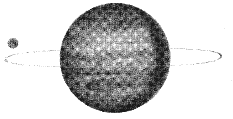网址:http://m.1010jiajiao.com/timu3_id_2384298[举报]
| |||||||||||||||||||||||||||||||||||||||||||||||||||||||||||||||||||||||||||||||||||||||
| |||||||||||||||||||||||||||||||||||||||||||||||||||||||||||||||||||||||||
阅读理解(Reading comprehension)
Jupiter's Moons and How They TravelMany moons of fupiter travel around the planet in different directions(方向).
Jupiter is the largest planet in our solar system. Over the years, scientists have found that Jupiter has its own small solar system. Earth has one moon. Jupiter has at least sixteen and probably more.
Since there are so many moons, scientists began to number them. The numerals(numbers) tell the sequence, or order, in which the moons were found. They were slower to name the moons. All of Jupiter's moons now have a name as well as a number.
The first five moons to be discovered are known as the “inner moons”. But they are not the closest to the planet. The closest is only 127, 600 kilometers away from Jupiter. All the inner moons circle the planet in counter-clockwise direction, that is, opposite of the hands of a clock.
Jupiter's middle group of moons are at least 11, 100, 000 kilometers from the planet. They also move in a counter-clockwise motion(moving). The four farthest moons are at least 20,700,000 kilometers away. These are called “outer moons”. They circle in a clockwise motion.
How many more moons do you think will be discovered?

1.What does “solar system” in this article mean?
[ ]
2.Things that travel in the same direction as the hands of a clock are said to be traveling in a________.
[ ]
A.clockwise direction
B.counter-clockwise direction
C.same direction
D.different direction
3.Jupiter's ________ group of moons travel in a clockwise direction.
[ ]
4.The numbers given to Jupiter's moons tell________.
[ ]
A.the order in which they were discovered
B.the order in which they travel
C.the order of their distance from Jupiter
D.the order of names
5.According to the passage, which of the following statements is true?
[ ]
A.None of Jupiter's moons have names.
B.Most of Jupiter's moons circle clockwise.
C.Jupiter's inner moons were discovered first.
D.Jupiter is the nearest planet to the earth.
6.How far away are the middle group of moons from Jupiter?
[ ]
A.It's not mentioned.
B.11,100,000 kilometers away.
C.127,600 kilometers away.
D.20,700,000 kilometers away.
查看习题详情和答案>>When Mary Smith was a student, she always wanted to become a teacher because she liked children. When she was twenty-one years old, she began teaching in a primary school(小学). She was a good teacher, and she got on well with the children in her class. They enjoyed her teaching.
One day one of the girls in her class asked her, “Miss Smith, why does a man's hair become gray much earlier than his mustache and beard(胡子) do?”
Mary smiled and said, “I'm sorry 1 don't know. Is it true that a man's hair becomes gray before his mustache and beard do?”
“
Yes, Miss Smith,” answered Helen, “it has happened to my father.” Hearing this, the other children in the class laughed aloud.Then one of the boys stood and said, “I know, men's hair becomes grey first because it's sixteen years older than their mustache and beard.”
(1) Mary liked ________ and they liked her, too.
[ ]
|
A .her children |
B .here pupils |
|
C .her boys |
D .her girls |
(2) Mary began teaching when she was ________.
[ ]
|
A .in her early twenties |
B .under twenty |
|
C .about thirty |
D .twenty-one |
(3) Who could answer Helen's question correctly?
[
]|
A .Mary. |
B .Helen. |
|
C .Helen's father. |
D .None of the above. |
(4) ________ becomes gray much earlier than ________ mustache and beard do
[ ]
|
A .None of men's hair…his |
B .Only a few man's hair…their |
|
C .Not all men's hair…their |
D .All men's hair…their |
(5) Which of the following is Not True?
[
]A
.Mary liked children very much when she was still a studentB
.The children in Mary's class enjoyed her teaching.C
.The hair of Helen's father became gray before his mustache and beard didD
.The boy was very clever and his answer was right. 查看习题详情和答案>>
| |||||||||||||||||||||||||||||||||||||||||||||||||||||||||||||||||||||||||||||||||||||||||||||||||||||||||||||||||||||||||||||||||||||||||||||||||||||||||||||||||||||||||||||||||||||||||||||||||||||||||||||||||||||
